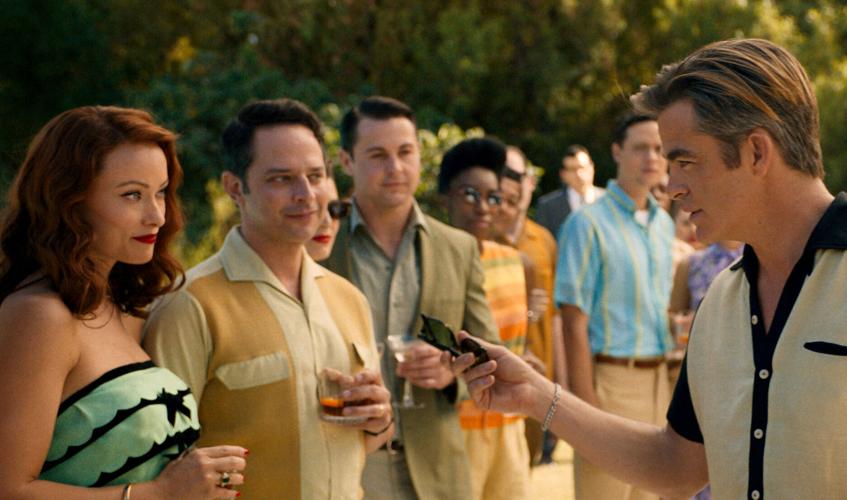Reviewed by GREG KING
Director: Olivia Wilde
Stars: Florence Pugh, Harry Styles, Chris Pine, Olivia Wilde, Nick Kroll, KiKi Layne, Gemma Chan, Douglas Smith, Timothy Simons, Asif Ali.

Set in the 1950s, Don’t Worry Darling is an enigmatic psychological thriller and domestic drama that is rich in atmosphere but short of answers.
Alice (Florence Pugh, from Midsommar, etc) lives in the quaint, picture perfect architect designed community of Victory, which is situated in the California desert. She is happily married to Jack (One Direction singer Harry Styles) who works for the Victory Project and seems to be rising amongst its ranks. It seems the perfect life for Alice. Every morning Jack and the other husbands head off to work at the Victory Project headquarters, leaving Alice and the other wives to clean house, chat, shop or attend dance classes. There seem to be certain rules to follow and codes of behaviour to observe, and the women are not permitted to leave the confines of Victory because it is deemed unsafe to venture beyond the town’s borders. The husbands are not permitted to talk about the work they do at the Victory Project headquarters.
But Alice begins to see cracks in the façade of this dystopian community and finds herself feeling uneasy and given over to uncomfortable and disturbing and disjointed dream fragments. After the strange death and disappearance of her friend and neighbour Margaret (KiKi Layne), Alice begins to question some of the town’s rules, which puts her in opposition to Frank (Chris Pine), the architect and unofficial leader of the town, who demands absolute loyalty from those living in the town.
Don’t Worry Darling is the sophomore feature from actress turned director Olivia Wilde, and it follows from 2019’s Booksmart. This is an enigmatic thriller set in a highly stylised vision of the 1950s, and it comments on gender roles and femininity of the era. The script is based on a story written by Carey and Shane Van Dyke, and the script has reunited Wilde with her Booksmart writer Katie Silberman. However, whereas Booksmart was savvy and smart Don’t Worry Darling is less successful, as the script raises more questions than it can satisfactorily answer, and it leaves the audience a little confused.
There is some superb production design from Katie Byron (Color Out Of Space, etc) that captures the 50s vibe for the town of Victory, especially with the bright neat look of the town (which has been inspired by the look of Palm Springs), and she gives the exterior of the Victory headquarters building itself an ominous quality. Frank talks of the beauty of symmetry and control within the community, and Wilde vividly illustrates this through the depiction of the houses arranged nicely in the cul de sacs that comprise the neighbourhood and the orderly procession of classic automobiles as the husbands head off to work. Wilde builds in some nice visual flourishes, aided by the mesmerising visuals of cinematographer Matthew Libatique, (a regular collaborator with Daniel Aronofsky) who gives the material a glossy surface that mask the disturbing tension beneath the surface.
Pugh brings strength and determination to her performance as Alice, but she also captures her uneasiness and her insecurities and conveys her growing sense of paranoia as she seems to descend into madness. This is a juicy role and she makes the most of it. Cast against type as the outwardly benevolent Frank, Pine has a suave and sophisticated surface, but he does show touches of a more sinister persona and quiet menace. In only his third feature film role Styles (he made his film acting debut in Christopher Nolan’s Dunkirk) acquits himself well. Casting Pugh and Styles as Alice and Jack has brought a real frisson of tension to their relationship which adds another layer to the drama. Wilde herself plays Bunny, Alice’s neighbour and best friend.
On the surface, the film seems to share some similarities with Bryan Forbes’ The Stepford Wives, the 1975 feminist cult classic that starred Katherine Ross, which was set in an idyllic community in which the dutiful wives were subservient to the needs of their husbands. Don’t Worry Darling serves up a critique of 1950s attitudes towards societal roles and gender roles, but despite its strong visual aesthetic it is ultimately let down by its scripting and a somewhat messy third act.
★★★



